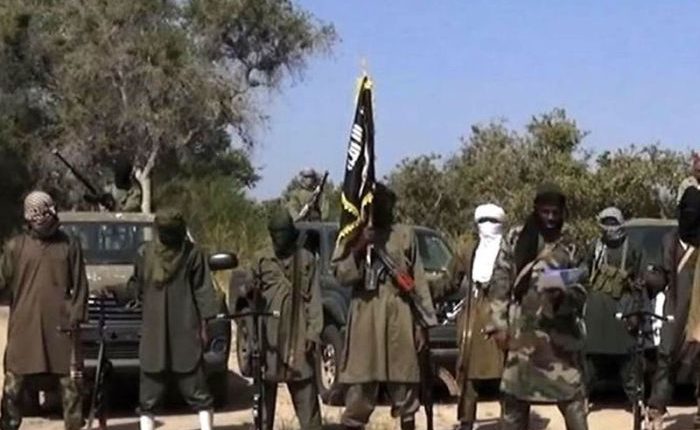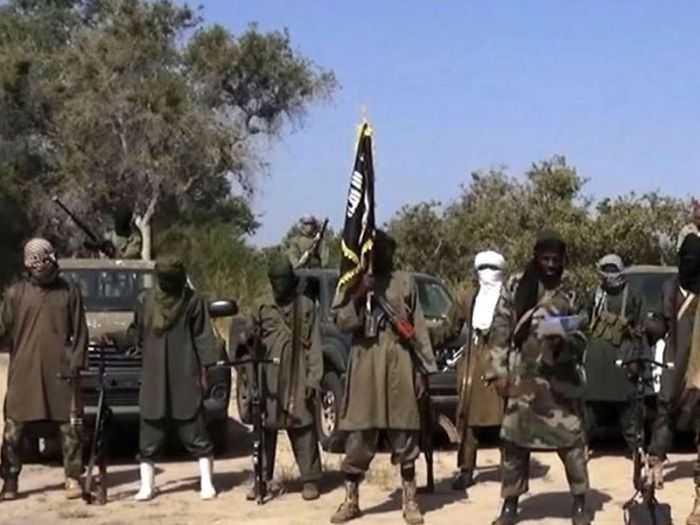Lying in bushes by the side of a road, the security officer played dead and hoped the militants would mistake the blood pooling from a colleague’s body as his own. He did not risk looking up to see what was happening, but he could hear.
“We warned you civilians not to take part in elections, but you refused,” said a fighter loyal to the extremist group Islamic State.
“Cut their throats.”
Kashim Shettima, governor of the war-torn northeastern Nigerian state of Borno, issued a statement two days later saying three people were killed when insurgents attacked his motorcade on route to an election rally.
But survivors of the Feb. 12 assault, along with two Nigerian and two international security personnel, put the toll much higher.
Reuters was unable to confirm precise figures. One survivor said he saw about 40 bodies; another estimated that as many as 100 died. The militants also took between 100 and 200 people captive, officials said.
The scale of the attack raises concern about the ability of militants from Boko Haram and a breakaway group calling itself Islamic State West African Province to disrupt voting in a delayed presidential election on Saturday, despite government assurances that only remnants of the insurgency remain.
“Islamic State and Boko Haram have over the past weeks ceaselessly warned locals that voting in the elections is tantamount to apostasy,” said Fulan Nasrullah, a researcher who tracks the groups at the Global Initiative For Civil Stabilisation, a Nigerian-based think tank.
“They have both explicitly threatened to attack the voters who go out to vote in these communities or who work with the electoral commission or otherwise carry out activities in support of the elections.”
Others interviewed by Reuters asked not to be identified because they said the government and military command had ordered them not to discuss the ambush, which could be damaging to both Shettima, a government politician, and Buhari. The president, who is seeking a second term, has vowed to defeat the insurgents once and for all.
A spokesman for the state governor did not respond to requests for comment on the accounts provided to Reuters, saying there might be a response later. A regional military spokesman referred questions to the state government.
Buhari urged Nigerians “to go out and vote,” assuring them in a televised address on Friday that adequate security measures were in place.
FATAL CHOICE
Shettima’s motorcade left the state capital Maiduguri in the morning, bound for the market towns of Mafa, Dikwa and Gamboru. The 85-vehicle convoy included buses full of supporters headed to campaign events, officials said.
In Dikwa, the local army commander urged the governor to stop for the night, according to one of the survivors and a Nigerian security official. Dusk was approaching, and the risk of an ambush was too high.
But Shettima decided to press on, they said. The governor’s office did not answer questions about the decision.
At 6:45 pm, as the convoy snaked past the village of Maula, dozens of fighters armed with rifles and rocket-propelled grenades attacked. It was unclear how they found the convoy.
Survivors heard grenades slam into the middle of the convoy, followed by a hail of bullets. The governor, who was in the front half of the convoy, escaped, they said, but those riding at the back were trapped.
“They then came out with two pickup trucks mounted with anti-aircraft guns, all of the fighters in military camouflage, while the rest of them came from the roadside, firing on us,” said a security official who was part of the motorcade.
Some people tried to escape by turning back. Others abandoned their vehicles and ran into the bush.
“As they ran, the insurgents opened fire,” the official said. “I would not be surprised if 100 people lost their lives.”
‘CUT THEIR THROATS’
Lying in the bushes next to his colleague’s body, the officer who was playing dead heard the militants begin to gather survivors by the roadside.
There, as the wrecks of the convoy vehicles smoldered, some were killed, he said. He later saw two fresh bodies, their throats slit.
The fighters ordered other survivors into the remaining vehicles and drove away with at least 100 people, said one of the witnesses and an international security official who looked into the attack. A Nigerian intelligence official put the number of captives as high as 200.
After the insurgents were gone, the hiding officer joined a flood of survivors fleeing through the bush, making for nearby towns and a military base. More than 200 men and women managed to escape, trekking through the night, another witness said.
The intelligence official and other security personnel corroborated the witnesses’ accounts.
At least 60 bodies were taken to a hospital morgue in Maiduguri after the attack, some with their throats cut, said a humanitarian worker who looked into the incident. A morgue official declined to comment.
It wasn’t immediately clear whether any Islamic State fighters were killed.
“SUPREME PRICE”
The ambush was part of a surge of attacks as Islamic State and Boko Haram seek to sow chaos during the election. Tens of thousands of people have been displaced since December.
Last Saturday, the day voting was supposed to take place before it was delayed for logistical reasons, six people were killed in a bomb blast in Maiduguri.
There have also been reports of dozens of people abducted from buses as they returned to their home areas to vote. The state government and military authorities declined to comment on those reports.
The morning after the ambush, soldiers returned to the scene, said one of the security officials who survived the attack. There, they recovered the body of one soldier, two civilians and 23 vehicles, leaving soon after.
The troops did not check far inside the bush, the survivor said.
On Tuesday, Shettima told reporters in the capital Abuja that he would return after the election to Gamboru – the town his convoy had tried to reach – “ready to pay the supreme price if need be”.
Source: Reuters


